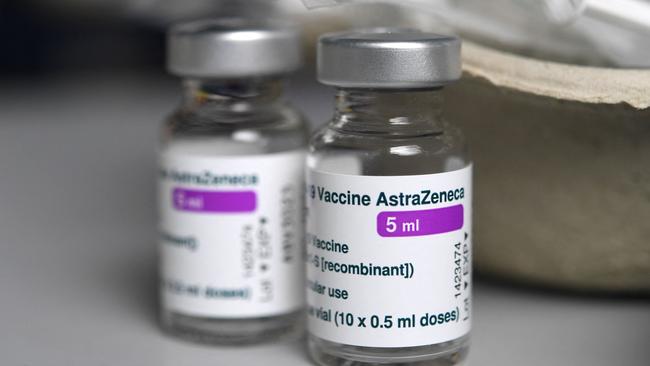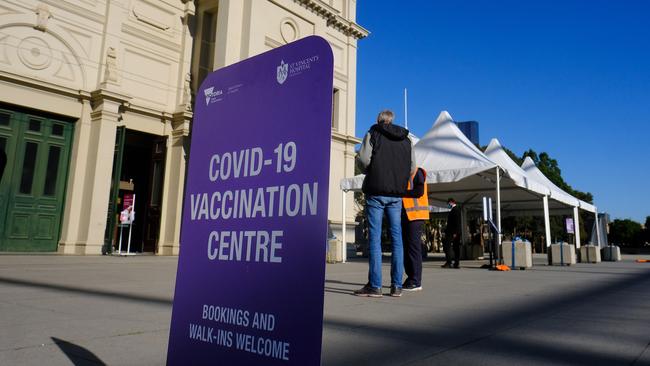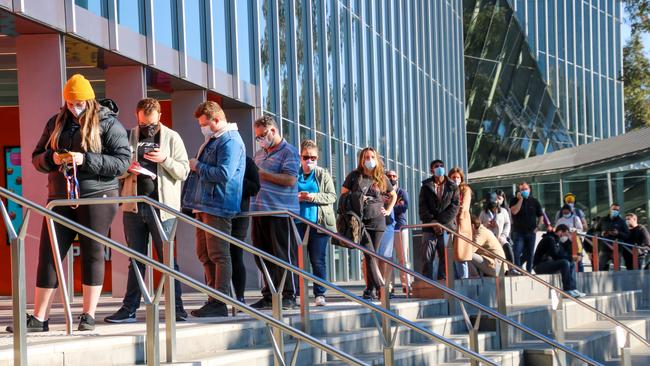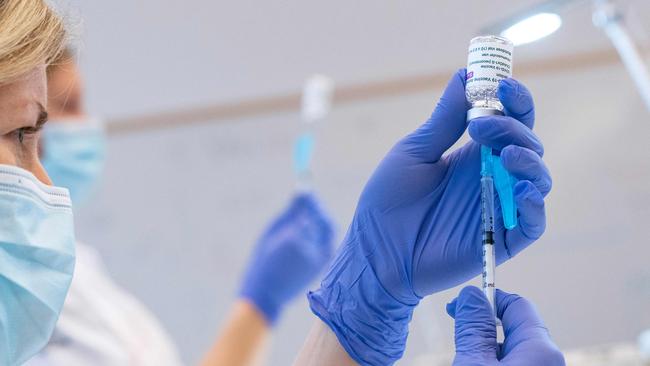Why Millennials shouldn’t worry about AstraZeneca vaccine
Brawling politicians have turbocharged debate over the Covid-19 vaccine rollout. See what the medical experts have to say on AstraZeneca and who should be getting it.
Coronavirus
Don't miss out on the headlines from Coronavirus. Followed categories will be added to My News.
A political storm has erupted this week over who should get the AstraZeneca vaccine.
The latest shake-up to the rollout scheme came on Monday night when Prime Minister Scott Morrison announced a no-fault indemnity scheme for GPs to give the AstraZeneca vaccine to people of all ages.
It opened the door for people under 60 to request the AstraZeneca vaccine from their GP.
But while the shift in messaging was not a change to the medical advice – it did ignite a bitter debate between some politicians and medical chiefs.
Australian Medical Association president Omar Khorshid said: “Unfortunately the Prime Minister’s thrown a little bit of a hand grenade into our vaccine program”.
The political fight escalated on Wednesday when Queensland chief health officer Jeannette Young spectacularly shot down the suggestion that people under 40 should be free to get the AstraZeneca jab.
“I don’t want an 18-year-old in Queensland dying from a clotting illness who, if they got Covid, probably wouldn’t die,” Dr Young said.
So as the politicians continue to squabble, we ask the medical experts to weigh in.
Should under 40s rush to book the AstraZeneca and do the risks outweigh the benefits of virus protection?
WHICH COVID VACCINE IS AVAILABLE?
There are currently only two Covid-19 vaccines currently available in Australia — Pfizer and AstraZeneca.

IS THE ASTRAZENECA VACCINE SAFE?
The country’s vaccine expert body Australian Technical Advisory Group on Immunisation(ATAGI) has recently recommended AstraZeneca be used by people aged 60 and over.
The vaccine was originally recommended for use in people aged over 50.
After a national cabinet meeting on Monday, Prime Minister Scott Morrison said a no-fault indemnity would be offered for GPs who give AstraZeneca vaccines to patients, which means GPs can now more freely provide them to patients who want them.
Associate Professor Hassan Vally, of La Trobe University’s Department of Public Health, said young people shouldn’t be worried about getting the AstraZeneca jab.
“It’s about putting that risk into perspective and understanding just how small that risk is,” he said.

“I think the more people who put their hands up to get AstraZeneca, the better.”
Victoria’s chief health officer Brett Sutton echoed that point on Tuesday, saying he was confident AstraZeneca was safe for people aged under 40.
“It’s a balancing of what the clinical risk was with the very rare instances of serious clots, against the risk of being exposed to Covid,” he said on Tuesday.
“We are at a point now where it is the most dangerous that Australia has looked in terms of outbreak potential for a long, long time.
“And so the advice will always change in terms of that risk. The risk of people being exposed to coronavirus through substantial outbreaks across Australia.

WHAT ARE ASTRAZENECA’S RISKS?
One identifiable risk of the AstraZeneca vaccine in younger people is developing thrombosis (blood clots) with thrombocytopenia syndrome (TTS).
This usually occurs after the first dose of the vaccine.
But Assoc Prof Vally said it was worth putting risks from vaccine side effects into perspective.
“Nobody can deny there is increased risk for AstraZeneca in young people,” he said.
“But it’s about putting those risks in perspective and understand how small that risk is.”
There is an estimated risk of TTS occurring after the first dose of AZ in 3.1 per 100,000 cases in people aged under 50.
For people aged 50-59 years that is 2.7, for 60-69 years it’s 1.4, for 70-79 years it’s 1.8 and for over 80s it’s 1.9.
“Even though there is that extra risk if you are younger, it’s not actually a big risk,” Assoc Prof Vally said.
SHOULD I BE CONCERNED ABOUT BLOOD CLOTTING?
Assoc Prof Vally said there was a greater risk of dying from participating in extreme sports than from a TTS blot clot after your first dose of AstraZeneca.
You are also much more likely to be murdered or die in a car crash, than after receiving your first AZ jab, Assoc Prof Vally found after compiling data for The Conversation.
Assoc Prof Vally said initially experts thought 25 per cent of people with TTS associated with the vaccine would die. But in Australia, this is now 4 per cent.
Two people in Australia have died from TTS after 3.8 million doses of the AstraZeneca vaccine, Assoc Prof Vally said.
This makes the likelihood of dying from this syndrome about 0.5 in a million, or about 1 in 2 million.
I’M SCARED OF GETTING ASTRAZENECA — IS THAT OK?
Yes. While many under 40s will be willing to roll up their sleeve to get vaccinated, Assoc Prof Vally didn’t want to dismiss those who held concerns over blood clotting.
“It’s a natural human reaction when you have choice to compare the pros and cons of different choices and we live in this consumerist society where we’re always trying to find the ‘best’ result,” he said.
“It’s totally understandable that we do this when there is a risk of something bad happening.”
CAN I GET A Covid VACCINE TODAY?
Yes, you can. In Australia, many age groups are eligible to receive either the Pfizer or AstraZeneca.
WHO IS ELIGIBLE FOR A COVID-19 VACCINE?
Newly eligible
– Anyone under 40 who consents to getting AstraZeneca
– All adults 40-49 years old
– All Aboriginal and Torres Strait Islander people aged 16 to 49
– NDIS participants, and carers of NDIS participants, aged 16 years and over
– Temporary visa holders aged under 50 years who are currently in Australia and have been approved for return travel to Australia through the travel exemption process.
Previously eligible
– All adults aged 50 and over
– Quarantine and border workers
– Aged care and disability care residents and staff
– People aged 16 and over with an underlying medical condition or significant disability.
– Critical and high risk workers aged 16 and over including defence, police, fire, emergency services and meat processing.
– Individuals with an Australian Border Force outwards travel exemption in an eligible category

WHO ISN’T ELIGIBLE?
— All adults aged 16 to 39, unless otherwise eligible (see above)
— Children aged under 16 (pending TGA approval).
WHAT VACCINE IS RECOMMENDED FOR MY AGE GROUP, HOW CAN I GET IT?
Over 60
– AstraZeneca
– Available at GP clinics and Commonwealth Vaccination Clinics (formerly GP respiratory clinics).
Over 50
– Pfizer
– Available at GP clinics and Commonwealth Vaccination Clinics (formerly GP respiratory clinics).
40-49
– Pfizer
– Must call the coronavirus Hotline on 1800 675 398.
– Some GP clinics are offering Pfizer vaccinations.
Under-40s
– AstraZeneca
– Available at GP clinics.

WHY DO I NEED TO GET VACCINATED?
Prof Catherine Bennett, Deakin University Epidemiology Chair, said if more people aged under-40 got the vaccine, it may take pressure off Pfizer supplies.
“This may bring forward the next eligible age group for Pfizer,” she said.
“It’s a tiny risk that helps other people get vaccinated.”
Assoc Prof Vally said the benefits of getting the vaccine were huge.
“We aren’t getting the vaccine to protect us in Australia (unlike some other countries), but we are getting the vaccine now to protect us in the future, when we expose ourselves to more risk when we open the borders and move around a bit more.”




